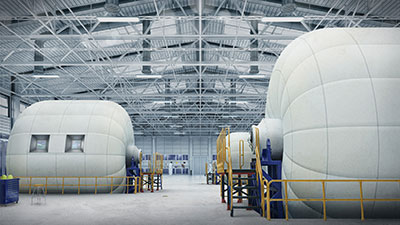Sierra Space and ILC Dover Partner to Build the Space Infrastructure of the FutureSierra Space, a leading pureplay commercial space company building the first end-to-end business and technology platform in space, announced today (April 18) that it has formed a long-term strategic partnership with ILC Dover, the leading provider of softgoods technologies and spacesuits. The partnership will accelerate the on-orbit installation of affordable and high-volume LIFE (Large Integrated Flexible Environment) inflatable modules that will be the catalyst for the commercialization of space leveraging the Sierra Space platform. The two companies have also partnered to design the next generation of spacesuits for both extra- and intra-vehicular activity (EVA and IVA).

"We are building the first commercial end-to-end platform in space that will provide the necessary affordable unit economics, with our large expandable family of space modules, to accelerate biotech and industrial companies to design and build their next breakthrough products in our microgravity factories," said Sierra Space CEO Tom Vice. "Our first inflatable space habitat and research module will provide one-third the pressurized volume of the entire International Space Station (ISS) in a single launch. This technology will scale quickly, allowing our team to put into low-Earth orbit a single module with greater pressurized volume than the entire ISS – also in a single launch."
ILC Dover will be an exclusive partner with Sierra Space for softgoods used to support inflatable space habitat systems for low-Earth orbit (LEO), lunar and Mars transport and surface habitation, and use cases even farther into deep space.
"We are thrilled to partner with Sierra Space as part of the next era of space exploration and the emerging commercial space economy," said ILC Dover CEO Corey Walker. "As a leading solutions provider in the space industry, our collaboration with Sierra Space highlights the strength of ILC Dover's heritage and the demand for our market leading technologies in the rapidly changing space economy. It will soon be a reality for more humans to visit and work in space, and our team looks forward to this innovation's potential impact on humanity that will come from enabling more research to be completed in low-Earth orbit."
The collaboration is an important step toward building commercial space stations and other critical infrastructure that enable humans to live in space for extended periods of time. Sierra Space will also exclusively partner with ILC Dover for the Sierra Space EVA and IVA spacesuits.
"The commercialization of LEO requires the largest astronaut workforce in history," Vice continued. "Our company has established its own human spaceflight center and astronaut training academy, and through this agreement with ILC Dover, we will build the next generation of EVA and IVA spacesuits that seamlessly integrate with the Dream Chaser and our space destinations."
ILC Dover and Sierra Space have been working to build and test the Large Inflatable Flexible Environment (LIFE) habitat, a key component of Sierra Space's in-space destinations technology portfolio. Different than the rigid complexity of the International Space Station, LIFE is compactly stored inside the fairing of a rocket. Once launched into space, the lightweight habitat expands to the size of a three-story building and serves as a commercial habitation, science and bio pharma platform for humans to live and work comfortably in LEO and beyond.
ILC Dover's years of spaceflight experience, combined with its proven systems and processes, ensure a high level of quality, reliability and safety built into the inflatable living space. LIFE will serve as both the habitation and payload element for LEO space stations, such as Orbital Reef. ILC Dover will continue to work closely with Sierra Space as its LEO presence and mission continue to scale.
Since July 2022, Sierra Space and ILC Dover have joined NASA in successfully completing a variety of pressure tests on one-third-scale versions of LIFE (click here for the latest test results). All four tests exceeded NASA's certification requirements and demonstrated the inflatable structure's integrity for sustaining human life in space for greater than 60 years.
The companies and NASA will continue to collaborate on the next series of one-third scale LIFE certification tests, which will focus on inserting hard structures into the pressure shell and correlating the results to previous tests. Full-scale LIFE habitat tests should begin later this year.












